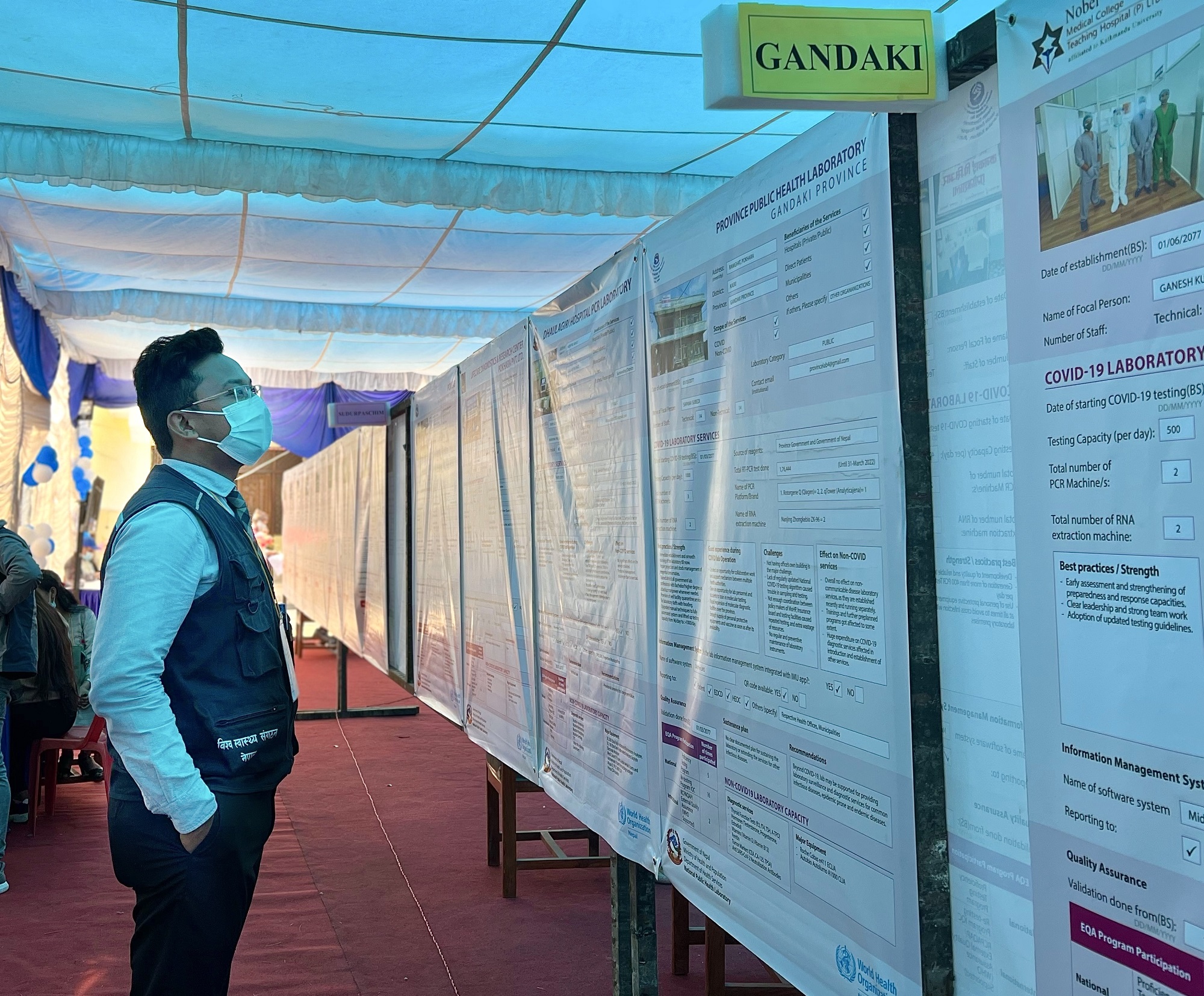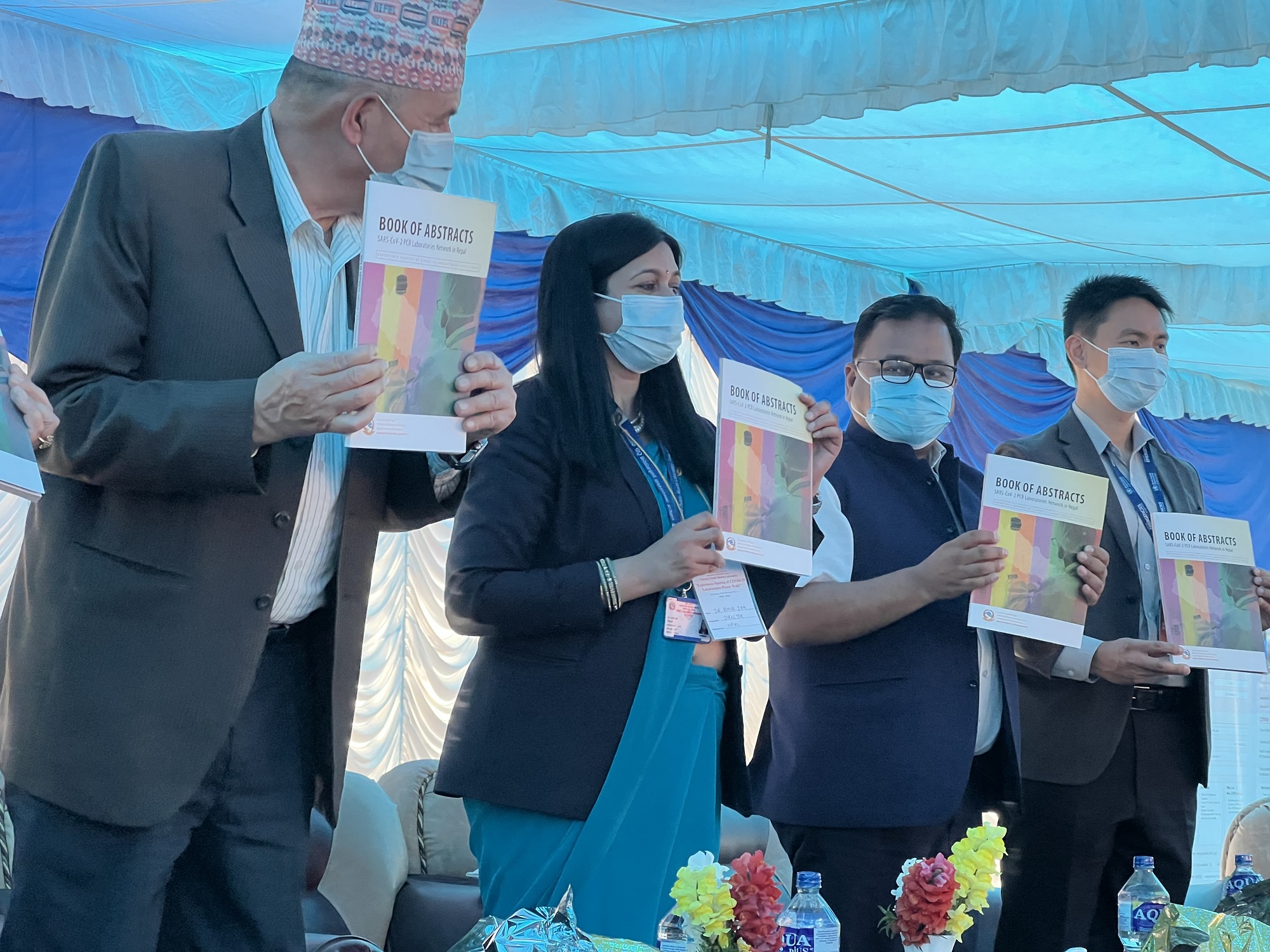More than 80 COVID-19 laboratories participated in a 'poster walk' to discuss best practices, strengths, and challenges for creating a stronger response to COVID-19 and other health emergencies.
Nepal has come a long way in enhancing its laboratory capacity for diagnostics with the establishment of more than 100 laboratories conducting RT-PCR tests, especially for COVID-19 samples, spread in all provinces.
The pandemic has now emphasized the need of an integrated, coordinated disease surveillance system with accessible surveillance and laboratory data. This will support decision-makers to improve preparedness and timely responses to various emerging and re-emerging diseases, especially influenza and SARS-CoV-2.
As a starting point to create such a system, the National Public Health Laboratory (NPHL), Ministry of Health and Population (MoHP), with support from the World Health Organization (WHO), Country Office for Nepal, brought all the designated COVID-19 laboratories together to share learnings and experiences in laboratory response, best practices, and challenges faced during the two years of pandemic response at the event - Experience Sharing of COVID-19 Laboratories (Poster Walk).

Dr. Runa Jha, Director of the National Public Health Laboratory, brief attendees on the Poster Walk. Photo Credit: WHO Nepal/S.Shrestha
WHO, Country Office for Nepal, provided technical and financial assistance with funds from the WHO Pandemic Influenza Program (PIP).
The experiences, shared by both public and private laboratories, showcased the importance of laboratory preparedness to any public health emergency, and emphasized the importance of a well-coordinated and robust public laboratory network in guaranteeing Nepal's health security. Stakeholders also found that the existing structure of the laboratory network needed to be updated strategically based on WHO guidance along with the testing guidelines and manuals and testing Standard Operating Procedures (SOPs).

Details of all COVID-19 laboratories from all provinces were displayed at the event. Photo Credit: WHO Nepal/S.Shrestha
Key recommendations included future utilization of these laboratory resources for the diagnosis and surveillance of infectious diseases, better coordination mechanisms between the three tiers of the government, and implementation of a comprehensive laboratory quality assurance procedure for every new laboratory in the country - a crucial component of the process of expanding laboratory capacity for the COVID-19 pandemic response.

Panel discussion held to share the experiences, best practices, and challenges of the provincial and subnational COVID-19 laboratories at the event. Photo Credit: WHO Nepal/S.Shrestha
Delays in the procurement of reagents/kits and in reporting the results due to a lack of efficient reporting mechanism were some of the major challenges reported. To resolve the issues, WHO supported in ensuring the availability of adequate reagents/kits throughout the year. WHO also supported the MoHP in the development of a uniform Information Management System (IMS) for proper reporting mechanisms and documentation of COVID-19.

Details on all COVID-19 laboratories from all provinces were displayed at the event. Photo Credit: WHO Nepal/S.Shrestha
“This meeting has provided a great opportunity to review the functional capacity of the public health laboratory and emergency response systems at the national and sub-national levels and to identify practical areas that need immediate remediation”, said Dr Rajesh Sambhajirao Pandav, WHO Representative to Nepal. “We must now focus on better coordination among the COVID-19 laboratory network and sustenance of the services.”

Dignitaries from the MoHP and WHO launched the Book of Abstracts at the event. Photo Credit: WHO Nepal/S.Shrestha
A publication - Book of Abstract - was also launched which details all the best practices adopted by the laboratories alongside challenges faced by each. Specific recommendations, provided to each laboratory by the MoHP and WHO, is also included in the publication. It also provides further insights into details on operational aspects including equipment/reagents and participation in the quality assurance program for the laboratory network.

Certificate of appreciation to express gratitude for valuable contribution during the pandemic was awarded to each designated COVID-19 PCR testing laboratories at the event. Photo Credit: WHO Nepal/S.Shrestha
"Many lessons were learned from the collaborative approach between the government, academia, and the private sector to support the establishment of a comprehensive laboratory network for COVID-19, which allowed laboratories to be expanded to every district and beyond. The road leading to better preparedness for public health surveillance and pandemic response was difficult, but achievable with good efforts, vision, and collaboration, with support from WHO and partners”, stated Dr Runa Jha, Director of NPHL.
